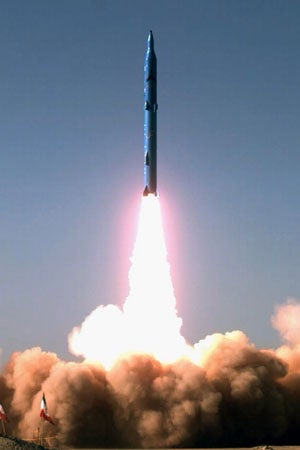The rest of the world has woken up to the fact that Iran is a problem on a large scale. Salon magazine, however, is determined to bury its head in the proverbial sand. The online magazine is running a series of articles to discredit anyone who argues for taking out Iran’s nuclear facilities with military force, an option being debated with increased urgency as Iran’s belligerence escalates. Salon is showing its hand as an apologist for President Obama’s failed policies in dealing with Iran—blaming everyone but the guy who is actually in charge. If Obama is blamed for anything, it is for not being pacifist enough.
Salon peddles disinformation with such persistence out of fear that 1) a Middle East conflagration will ensue, and 2) an attack on Iran will provoke Tehran to close the Strait of Hormuz, creating a global energy crisis. These fears lead Salon to embrace appeasement at all costs.
Of course, the Middle East is already beset by instability, and indeed, Persian Iran is not so universally admired by Arab nations that they can be counted on to spring to its defense. As for the weapon of oil, Heritage research has shown that while an Iranian blockade of the Strait of Hormuz for just one week would initially cause oil prices to spike alarmingly, the adoption of the right policies in response would allow world oil markets to adjust, minimizing economic harm.
The latest hyperventilating post (February 10) is Matt Duss’s “The neo cons’ big Iran lie: The right-wing hawks who thought Iraq would be a cakewalk think it’d be easy to attack Iran. Real soldiers say no.” Duss, an analyst at the Center for American Progress, brings back “neo-con” scaremongering, a tried and true tactic of opponents of the Iraq war, smelling of intellectual dishonesty.
In fact, the person who started the most recent debate over the military option on Iran can hardly be described as a neo-con at all: Matt Kroenig, who penned the article “Time to Attack Iran” in the December/January issue of Foreign Affairs magazine, was a member of the Obama Administration as Pentagon adviser on Iran policy from July 2010 to July 2011. Yet Kroenig is not so much Duss’s target as the people who have expressed support for his arguments—scholars from the Foreign Policy Initiative and the American Enterprise Institute and writers in The Wall Street Journal and The Washington Post.
Furthermore, the military leaders cited by Duss as the voices of reason—Admiral Mike Mullen and General Anthony Zinni among them—have not spoken out about Iran recently. Instead, their comments are pulled from old speeches and congressional testimony. The dishonest techniques used in this article are a recurring feature in a series based on little fact.
The fact—which Salon deliberately ignores—is that a consensus on dealing with Iran is growing across the political spectrum. On February 1, the Bipartisan Policy Center’s (BPC) National Security Project released its fourth report on Iran’s nuclear development. According to the report, “Meeting the Challenge: Stopping the Clock,” co-authored by a 13-member bipartisan task force of prominent experts co-chaired by former Senator Chuck Robb (D–VA) and retired General Charles Wald, a successful outcome in Iran depends on U.S. resolve, including making the necessary preparations for military action.
Another straw man in Salon is Gene Lyons’s “Israel’s Real Target: Obama.” The target in the blame game this time is the state of Israel. Lyons’s piece is nothing but a conspiracy theory masquerading as journalism: The Israeli Cabinet reportedly believes that President Obama is “dangerously naïve” in dealing with Iran (they are hardly alone in reaching this conclusion) and therefore a danger to Israel. Lyons does not elaborate much on the exact Israeli scenario for destabilizing President Obama but argues that this is Prime Minister Benjamin Netanyahu’s real goal, as opposed to taking out Iran’s nuclear weapons. “To put it bluntly, it’s not so much the regime in Tehran that Netanyahu is keen to destabilize as the one in Washington. The question is how far he is willing to take it.” He includes no supporting facts.
Indeed, the absence or disregard of fact is a recurring aspect of the Salon series. In “How Obama became vulnerable on Iran,” Trita Parsi, an Iranian scholar and an apologist for the Tehran regime, argues that Obama prematurely abandoned his engagement policy and “avoided a national debate” over Iran. Indeed, after the June 2009 crackdown on democratic protests, the Obama Administration became positively defensive about its attempts at engagement.
“The administration’s posture simply doesn’t convey confidence over its record and approach,” Parsi writes. There is, of course, not very much for the Administration to be confident about since, as Parsi himself admits, Iran’s nuclear program has progressed, and there is a growing sense of crisis that nothing short of military action will stop it.
Furthermore, there was never any sign that Iran responded positively to engagement overtures from the Obama Administration. The President’s famously “outstretched hand” has never been met by anything but a clenched fist from Tehran. Engagement with Tehran is a dream, and appeasement is no answer to the Iranian problem.
